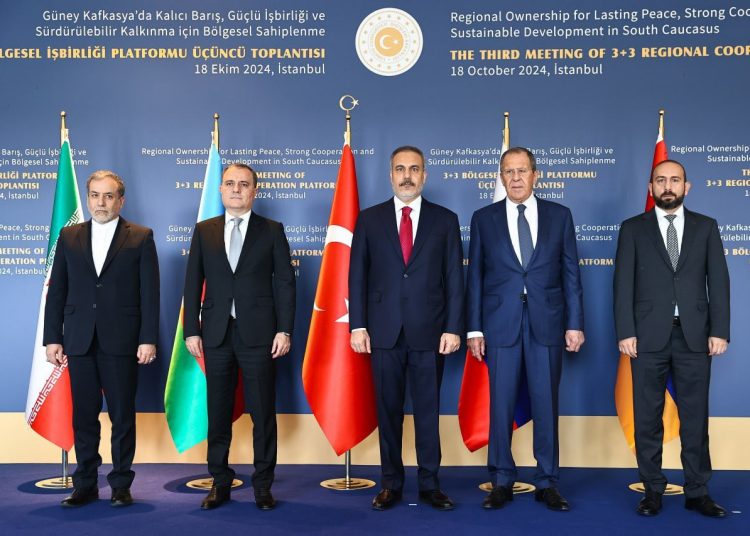The upcoming meeting of the foreign ministers of Iran, Russia, Armenia, Turkey, and Azerbaijan in Istanbul on October 18 marks a significant step forward in the ongoing efforts to foster regional cooperation in the South Caucasus through the 3+3 format. This gathering, following the previous meeting in Tehran, underscores the collective commitment of these nations to address pressing regional issues, enhance transit cooperation, and build a foundation for sustained dialogue.
Reflections on the Tehran Meeting
The Tehran summit, held in October 2023, served as a pivotal moment in reshaping regional dynamics. Despite the notable absence of Georgia, which rendered the meeting somewhat incomplete, the participating countries engaged in substantive discussions aimed at mitigating tensions and promoting stability. Iran’s active engagement highlighted its strategic interest in the Caucasus, emphasizing the nation’s desire to play a constructive role in regional affairs.
Iran, leveraging its historical and geographical ties to the Caucasus, has been increasingly proactive in advocating for peaceful resolutions to conflicts and fostering economic collaboration. The Tehran meeting allowed Iran to articulate its vision for the region, emphasizing the importance of sovereignty, territorial integrity, and non-interference in internal affairs.
Agenda for the Istanbul Summit
The Istanbul meeting is poised to build upon the groundwork laid in Tehran. One of the central topics expected to dominate discussions is transit cooperation, particularly following the recent positions on contentious Zangezur corridor. This corridor, which would connect Azerbaijan to its exclave Nakhchivan through Armenia’s Syunik province, has been a focal point of regional contention.
Iran’s stance on the Zangezur corridor is of paramount importance. Tehran advocates for any transit routes to respect the sovereignty and territorial integrity of the nations involved. Iran opposes any arrangements that could alter international borders or undermine regional stability.
The foreign ministers are also expected to address broader issues such as security cooperation, economic partnerships, and cultural exchanges. The goal is to create a collaborative environment where mutual interests supersede historical grievances.
Escalation in Middle East
The foreign ministers of five countries will convene in Istanbul as the war in Gaza surpasses one year. Their previous meeting occurred shortly after the conflict began. Israeli aggressions have escalated regional tensions, with intensified strikes in Lebanon and targeted assassinations of Hezbollah and Palestinian leaders pushing the region to the brink of full-scale war. These actions have also provoked a response from Iran, significantly increasing the risk of a broader conflict. The upcoming 3+3 foreign ministers’ meeting is expected to address these issues and discuss measures to halt Israeli attacks on Palestinian and Lebanese people.
The 3+3 Format: A Platform for Dialogue
The 3+3 format, encompassing the three South Caucasus countries (Armenia, Azerbaijan, Georgia) and their three larger neighbors (Iran, Russia, Turkey), presents a unique framework for regional dialogue. Despite Georgia’s current reluctance to participate, possibly due to its strategic alliances and internal considerations, the format holds significant potential for comprehensive regional cooperation.
This platform allows for direct communication channels among nations with intertwined histories and shared challenges. By bringing together countries with varying perspectives, the 3+3 format encourages the negotiation of differences through diplomacy rather than conflict. It provides an avenue to address critical issues such as border security, trade facilitation, and infrastructure development collaboratively.
Iran’s Role and Regional Cooperation
Iran’s involvement is crucial given its strategic position and influence. By advocating for solutions that emphasize regional ownership of issues, Iran positions itself as a mediator capable of balancing interests. Tehran’s proposal for the Syunik passage exemplifies its approach to seek mutually beneficial outcomes that respect all parties’ concerns.
The potential for increased transit cooperation is immense. By developing transportation links that connect Europe and Asia through the South Caucasus, the region can become a pivotal hub for international trade. Such developments would not only boost the economies of the involved countries but also contribute to regional stability by intertwining their economic interests.
Looking Ahead
The Istanbul summit represents an opportunity to solidify the progress made and address unresolved issues. Success hinges on the willingness of the participating nations to compromise and prioritize collective benefits over unilateral gains. The absence of Georgia remains a challenge; however, continued diplomatic efforts may eventually encourage its participation, making the 3+3 format truly comprehensive.
By focusing on collaborative solutions and respecting each nation’s sovereignty, the involved countries can pave the way for lasting peace and prosperity in the region. The 3+3 format, with its inclusive approach, has the potential to transform historical tensions into constructive partnerships, benefitting not only the South Caucasus but the broader international community.






